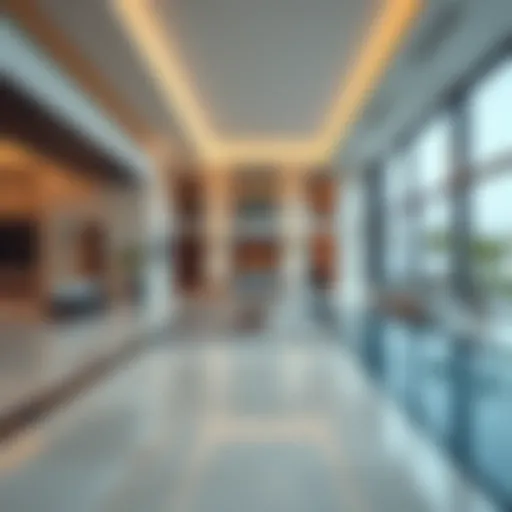Major Developers in Dubai: Insights into Real Estate
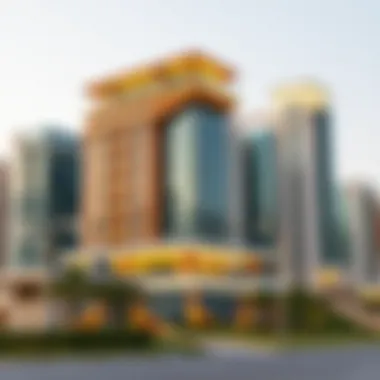

Intro
In the vibrant and ever-evolving landscape of Dubai, the real estate sector stands as a testament to ambition, innovation, and architectural marvels. Major developers in this flourishing city have played a pivotal role not just in shaping the skyline but also in defining investment patterns and market dynamics. Understanding who these key players are, their philosophies, and the vast portfolios they manage can provide invaluable insights for investors, expatriates, and anyone interested in the property market.
The developers in Dubai have collectively contributed to a unique blend of luxury and accessibility, making the city one of the most sought-after destinations for property investment. Each developer, armed with their distinct ethos and strategies, contributes to a competitive environment rich in opportunities. In the following sections, we will embark on a detailed examination of these developers, exploring their flagship projects, innovative approaches, and the market trends that define the current real estate climate.
Equipped with this knowledge, readers will be better positioned to navigate their investment journeys in Dubai’s complex property sector.
Foreword to Dubai's Real Estate Development
Dubai, a shimmering jewel in the Arabian Peninsula, has morphed into a global hotspot for real estate development. With its skyline punctuated by architectural marvels and ambitious projects, the city is a testament to what happens when vision meets investment. The allure of Dubai's real estate market extends beyond mere aesthetics; it encapsulates economic growth, tourism trends, and lifestyle aspirations, making it vital for investors, buyers, agents, developers, and expatriates alike to understand this dynamic sector.
Real estate development in Dubai is not just an economic engine for the city, but a reflection of its cultural ethos and global aspirations. The government's progressive policies encourage foreign investments while ensuring a stable environment for property transactions. These include initiatives like the long-term residency visas and the Dubai Land Department's simplified buying process, which have further stoked the fires of interest from global investors.
Various key elements underscore the importance of grasping the nuances of Dubai’s real estate development:
- Economic Influencer: This sector plays a crucial role in the emirate’s economy, contributing significantly to GDP. Understanding this helps stakeholders predict economic cycles and market movements.
- Tourism and Lifestyle: Many projects are designed not just for local residents, but to appeal to tourists and expatriates seeking a luxurious lifestyle. Awareness of these trends can guide investment decisions.
- Innovative Trends: The constant evolution of design and technology in projects makes it essential to stay informed on upcoming developments.
- Sustainability Focus: Dubai is increasingly embracing sustainable and eco-friendly development principles. Grasping these trends can inform better investment choices in the long run.
As investors and stakeholders delve into the intricacies of Dubai's booming real estate landscape, they will find themselves at the crossroads of opportunity and challenge. With this introduction serving as a springboard, the ensuing sections will intricately examine how various developers are shaping the market, their historical context, and what the future holds for this vibrant sector.
"The beauty of a city’s architecture reflects its progression and innovation, a saying that resonates strongly in Dubai's evolving urban landscape."
In summary, understanding Dubai's real estate development is not just about navigating the market; it's about grasping the essence of what makes this city a desired destination in the global real estate arena. With that foundation laid, the subsequent sections will provide deeper insights into the evolution of developers and key players in this ever-changing market.
The Evolution of Real Estate Developers in Dubai
Understanding the evolution of real estate developers in Dubai is crucial for grasping how the market has transformed into a vibrant landscape. Over the past few decades, this sector has seen phenomenal growth with numerous influences shaping its trajectory.
The narrative begins with the blend of traditional practices and modern innovations, resulting in a unique real estate environment. Observing this evolution helps to identify emerging trends and strategies that developers utilize today, providing valuable insight for investors and stakeholders looking to navigate this dynamic market.
Historical Context
Historically, Dubai was a modest fishing and trading port. Its real estate landscape was rudimentary, with minimal infrastructure and limited development. The turning point was the discovery of oil in the 1960s, which brought not only wealth but also a wave of foreign investment and a need for modern facilities. The government took proactive measures by establishing a structured regulatory framework to attract developers and investors. This resulted in substantial urban projects laying the groundwork for a robust real estate market.
By the 1980s and 1990s, developers like Emaar Properties began making their mark with large-scale projects such as the Dubai Marina and Burj Khalifa. These developments symbolized Dubai's ambitions and commitment to becoming a global city, serving as a mecca for tourism and commerce. At the same time, the advent of freehold property laws in the early 2000s opened the floodgates for expatriates to invest in property, fueling even more growth and diversification.
Modern Development Trends
Today, the real estate sector in Dubai is characterized by several modern development trends, each reflecting changing consumer demands and technological advancements. One notable trend is the emphasis on sustainable development. As environmental concerns rise globally, developers are increasingly integrating green practices into their projects, from energy-efficient buildings to community-based living spaces that promote social interaction.
Another trend is the shift toward mixed-use developments, which combine residential, commercial, and recreational spaces into a cohesive environment. This approach not only maximizes land use, but also enhances lifestyle options for residents. Developers such as Meraas exemplify this trend with projects like City Walk, a vibrant urban hub where living, shopping, and entertainment coexist seamlessly.
Technological innovations also play a massive role in current real estate strategies. The use of proptech, from virtual reality tours to AI-driven market analysis, allows developers to cater more effectively to potential buyers. Such tech-driven approaches not only improve operational efficiency but also enhance the overall customer experience.
In summary, the evolution of real estate developers in Dubai reflects a narrative of resilience and adaptability. From humble beginnings to its current status as a beacon for global real estate investment, understanding this evolution provides essential insights into market dynamics, potential opportunities, and the challenges that lie ahead.
Key Players in Dubai's Real Estate Market
Dubai's real estate market is a vibrant tapestry woven with the expertise and vision of various developers. Key players in this field significantly shape the landscape, and their roles vary from pioneering landmark projects to influencing market trends and consumer choices. Understanding these key players is essential not only for potential investors but also for buyers and stakeholders who are looking to navigate this fast-paced sector effectively.
Real estate developers in Dubai do not operate in a vacuum; they are influenced by the evolving economy, their corporate strategies, and emerging market demands. By familiarizing oneself with major players like Emaar Properties, Damac Properties, Nakheel, and Meraas, we can gather invaluable insights into how developments align with modern living, sustainability, and technological integration.
Emaar Properties
Foundational Background
Emaar Properties stands tall as a beacon of innovation in Dubai's real estate landscape. Founded in 1997, this developer has been at the forefront of the city's rapid transformation. Their foundational background intertwines closely with the vision of Dubai's leadership to nurture a global hub. Emaar's commitment to excellence is evident through its diverse portfolio, which includes residential, commercial, and hospitality elements. The foundational aspect of Emaar is its responsive approach to market demands, which makes it a reliable choice for investors and homebuyers alike.
Highlights of Emaar Properties:
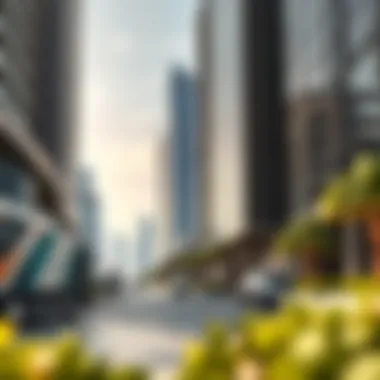

- Innovative Vision: Emaar started with a goal to craft iconic developments that not only cater to luxury but also enhance urban life.
- Enduring Reputation: Their strong foundation in Dubai creates a level of trust that attracts international investors.
- Social Responsibility: Emaar actively contributes to community projects, enhancing its reputation even further.
Signature Developments
Signature developments from Emaar, such as the Burj Khalifa and Dubai Mall, define the skyline and experience of Dubai. These projects are not mere constructions; they are monuments to architectural brilliance and represent Dubai's ambitions. The uniqueness of these developments lies in their integrated mixed-use nature, combining lifestyle, leisure, and workspaces in a cohesive manner.
Each signature project enhances Dubai's appeal as a tourist destination and cultural hub, making Emaar's contributions not just about buildings but about creating a lifestyle.
Influence on Market Trends
The influence of Emaar on market trends is evident through the various dynamics they introduce to the real estate scene. With strategies that prioritize sustainability and smart living, Emaar sets benchmarks that competitors often aspire to match. For example, their push for eco-friendly technologies and smart home integrations caters not just to current buyers but shapes future expectations. This proactive stance positions Emaar as a trendsetter in the industry.
Damac Properties
Corporate Strategy
Damac Properties, founded in 2002, brings an appeal that centers on luxury and innovation. Their corporate strategy emphasizes creating high-end, boutique developments that cater to affluent clientele. This approach has made them a significant player in the market, targeting not just local buyers but attracting international investors as well.
Damac's strategic tie-ups with fashion and lifestyle brands distinguish them from competitors, allowing for unique residential offerings. Their corporate strategy fosters a brand that resonates with exclusivity and a luxurious lifestyle, making the developer a favorable choice for investors looking for premium market opportunities.
Notable Projects
Among its notable projects, Damac Hills stands out as a luxurious community featuring a golf course and lavish villas. These developments not only redefine luxury living but also demonstrate how Damac tailors their offerings to meet the demands of discerning clients. The unique features of Damac's projects often attract considerable attention due to their focus on high-quality finishes and architectural innovation.
Market Positioning
Market positioning is crucial for Damac Properties as they navigate a competitive landscape. Their luxury branding enables them to command higher price points, appealing especially to expatriates and wealthy investors. Damac's commitment to fostering a recognizable brand through luxurious offerings plays a significant role in their enduring success within Dubai’s real estate market.
Nakheel
Flagship Endeavors
Nakheel is perhaps best known for its ambitious projects like the Palm Jumeirah. Flagship endeavors such as this have put Nakheel on the global real estate map, demonstrating their capacity to conceptualize and execute grand visions. The scale and ambition of Nakheel's projects underline their importance in shaping not only Dubai's skyline but also its economic landscape.
These flagship projects are not just engineering feats; they contribute significantly to local tourism and the hospitality sector, making Nakheel’s work vital for Dubai's economy.
Community Development
Community development is another cornerstone of Nakheel’s philosophy. Their projects often incorporate parks, retail spaces, and community-oriented facilities that foster a sense of belonging. This holistic approach enhances the living experience and tells a story of growth and shared resources. Ensuring that communities thrive beyond mere residential options is why Nakheel is often seen as a pioneer in this regard.
Impact on Tourism
Nakheel's impact on tourism is noteworthy, especially with its luxury resorts and recreational offerings. For instance, the vision behind the Palm Islands attracts millions of visitors each year, thus bolstering the economy. As such, Nakheel is not simply developing properties; they are sculpting a narrative of luxury that entices visitors, thereby making significant contributions to Dubai's long-term tourism strategies.
Meraas
Vision and Goals
Stemmed from a visionary mindset, Meraas was founded with aspirations to elevate urban living in Dubai. Their vision and goals encompass creating vibrant, mixed-use communities that harmoniously blend residential, commercial, and retail spaces. This strategy positions Meraas as a frontrunner in reshaping urban landscapes, aligning closely with the city's dynamic growth metrics.
Meraas’ vision embodies an understanding that modern communities need a blend of accessibility, sustainability, and aesthetic appeal that resonates with residents and tourists alike.
Mixed-Use Developments
The concept of mixed-use developments exemplifies Meraas' approach to real estate. Iconic projects such as City Walk not only provide superior residential and commercial options but also prioritize public spaces and social interactions. These mixed-use developments create environments where daily activities, leisure, and work coexist seamlessly.
Such projects uniquely position Meraas in the market, fostering community engagement and attracting a varied demographic.
Innovative Concepts
Meraas is committed to innovation, and their concepts often push the envelope of what's expected in real estate development. From unique architectural designs to smart technology integration, Meraas ensures that its projects stand out. This commitment to innovation results in environments that are not just built structures but experiences to be lived. These innovative concepts cater to modern lifestyles and pave the way for a future of real estate that embraces technology and creativity.
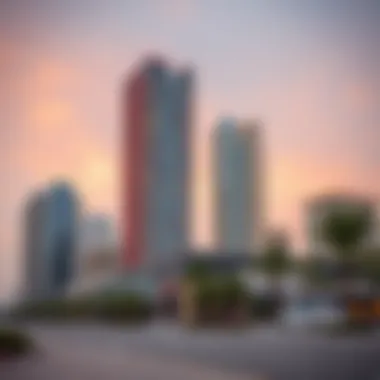

By examining these key players, potential investors and stakeholders can better navigate the complex and dynamic real estate landscape in Dubai, discerning trends, opportunities, and challenges that lie ahead.
As we advance to the next section, we will explore the contributions of international developers to the Dubai real estate market, analyzing how global partnerships and foreign investments play a crucial role in shaping the landscape.
The Contribution of International Developers
International developers have cast their nets wide into the futuristic waters of Dubai's real estate market. Their influence is not just noticeable; it’s pivotal. By bringing in vast experience, economic clout, and innovative practices, these developers have transformed Dubai from a mere desert into a global architectural marvel. The contributions from international developers have elevated the city's status on the world stage, attracting expatriates, investors, and tourists alike. In this section, we explore how these players have affected the market dynamics, what specific benefits they bring, and the considerations that stakeholders must keep in mind.
Global Partnerships
A noteworthy hallmark of international developers in Dubai is their tendency to forge strategic alliances with local firms. These partnerships tap into the local knowledge while leveraging the international experience. This synergy has resulted in some of Dubai’s most iconic landmarks. For instance, the collaboration between Emaar Properties and global architecture firms has led to landmark projects such as the Burj Khalifa and the Dubai Mall, symbolizing a blend of local vision and international expertise.
- Benefits to Local Economy: The infusion of international capital generally leads to job creation. Local subcontractors and suppliers often benefit economically from these projects, stimulating growth across various sectors.
- Cultural Exchange: Working alongside international developers often brings diverse building styles and ideas into the mix. This can be seen in the contrasting designs of the Palm Jumeirah by Nakheel or the innovative urban space designs by Damac.
- Infrastructure Upscaling: Global players also invest in upgrading local infrastructure, which can lead to better public services and amenities.
However, it’s not all smooth sailing. There can be hiccups in understanding local customs or navigating Dubai's regulatory frameworks, which necessitates careful management of expectations from both ends to ensure collaboration flourishes.
Impact of Foreign Investment
The waves of foreign investment have fundamentally reshaped the landscape of Dubai’s real estate scene. With international investors looking at Dubai as a melting pot of opportunity, the city has turned into a prime target for large-scale investments.
"Investors see Dubai not just as a place to buy property but as a gateway to an expanding market in the Middle East."
- Shaping Market Trends: The influx of foreign funds leads to fluctuations in market dynamics. International investors often have different risk appetites and investment strategies that can drive local prices upward, impacting how developers plan their projects.
- Diversification of Properties: Developers now offer a wider variety of properties to attract international buyers, from luxurious villas in Damac's Akoya Oxygen project to affordable apartment buildings that cater to the expatriate workforce. This diversification benefits both sellers and buyers by creating a more competitive marketplace.
- Regulatory Frameworks: Increased investment has prompted the Dubai government to introduce more investor-friendly policies, making the stellar market environment even more appealing and accessible.
International developers have not only contributed to the skyline of Dubai but have also redefined the business and investment landscape. This ever-evolving ecosystem is one that investors, buyers, and other stakeholders must navigate with careful consideration.
Market Dynamics Influencing Developer Strategies
Understanding the market dynamics that guide developer strategies in Dubai is crucial for anyone looking to invest or engage with the real estate landscape. These dynamics encapsulate the heartbeat of the market—how developers operate, the risks they navigate, and the strategies they implement. The synergy between economic conditions, regulations, and sustainability trends shapes the development projects that materialize across the city.
Economic Factors
Economic factors are perhaps the most immediate influences on real estate development. In Dubai, where the real estate market has been characterized by its volatility, developers remain keenly aware of indicators such as GDP growth, inflation rates, and employment figures. Economic booms can drive demand for property, prompting developers to ramp up their projects. Conversely, during downturns, many developers may adopt a more cautious approach, focusing on existing investments rather than new projects.
Additionally, fluctuations in oil prices can impact the economy, given the UAE's significant reliance on oil revenue. A rise or fall in oil prices often translates into changes in foreign investment, which further influences the real estate sector.
"In a city like Dubai, real estate isn't just about buildings; it's about understanding the economics that shape its skyline."
Moreover, the influx of expatriates contributes to evolving demand. As more individuals seek employment in Dubai, there’s an increasing need for housing, commercial spaces, and mixed-use developments. Recognizing these economic trends pushes developers to innovate and offer diverse property types, catering to a broad market spectrum.
Regulatory Environment
The regulatory landscape is another cornerstone of developer strategy in Dubai. The government enforces a stringent set of laws and guidelines to maintain the integrity of the real estate sector. Developers need to comply with zoning laws, building codes, and licensing requirements, which can vary greatly across different areas of Dubai. The Land Department plays a pivotal role in regulating transactions and ensuring transparency within the market.
Additionally, recent reforms in property ownership laws, such as allowing foreign ownership in designated areas, have opened doors for many international investors. This shift not only diversifies the market but also compels local developers to enhance their offerings, striving for more competitive pricing and innovative designs.
However, these regulations can also introduce challenges. For instance, the process of obtaining permits can be lengthy and complex, deterring some developers from pursuing certain projects. Keeping abreast of these changing regulations is essential for any developer to thrive in Dubai’s dynamic real estate environment.
Sustainability Trends
Sustainability in real estate is no longer merely a trend; it's becoming a requirement. Dubai's vision aligns with global efforts towards creating more eco-friendly living and working spaces. Developers increasingly face pressure to incorporate sustainable practices into their projects, whether that means striving for LEED certification or integrating renewable energy sources.
The Emirates Green Building Council advocates for sustainability, pushing developers to consider energy efficiency, water conservation, and responsible sourcing of materials. As a result, many new residential and commercial projects are designed with environmentally friendly technologies and materials in mind. Adapting to these sustainability trends not only aligns with governmental goals but can also be a selling point for eco-conscious buyers and investors.
Moreover, as urban populations grow, the push for sustainable cities has never been stronger. Developers who embrace this shift can differentiate themselves in the marketplace, potentially leading to greater demand for their projects.
In summary, navigating the market dynamics that influence developer strategies in Dubai requires a keen understanding of economic factors, regulatory environments, and sustainability trends. For investors, agents, and expatriates, being aware of these elements can significantly enhance their engagement with Dubai's real estate sector. The landscape is ever-evolving, and staying informed about these dynamics can be the key to successful property ventures.
Future Outlook for Real Estate Developers in Dubai
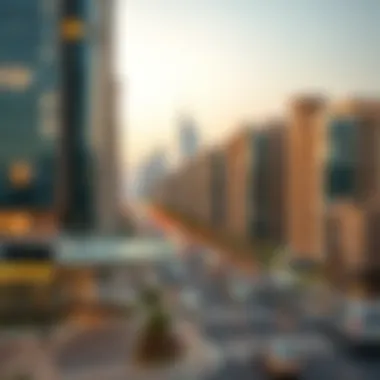

The real estate market in Dubai is on the cusp of a significant transformation, which makes understanding the outlook for developers in this thriving city crucial. As the property landscape evolves, various factors play into shaping opportunities and challenges ahead. Developers must adapt to these changes thoughtfully to maintain their competitive edge. The importance of this outlook lies largely in its implications for investors, prospective buyers, and real estate enthusiasts alike. How these developers strategize moving forward can reveal trends that will influence market dynamics for years to come.
Understanding the future outlook not only helps in anticipating shifts in design preferences and technology use but also sheds light on broader economic trends. As globalization intertwines with local market demands, the need for innovative solutions becomes paramount.
"The future belongs to those who believe in the beauty of their dreams."
– Eleanor Roosevelt
Emerging Opportunities
Looking ahead, the Dubai real estate market is brimming with opportunities for developers who are agile and attuned to the shifting desires of both investors and inhabitants. One of the most notable opportunities lies in integrating smart technology into residential and commercial developments. With a growing appetite for smart homes, features like advanced security systems, energy-efficient appliances, and home automation are becoming increasingly attractive. Developers who incorporate these elements could potentially draw in tech-savvy buyers, ready to invest in properties that promise higher quality of life and lower utility bills.
On a larger scale, sustainability is rapidly becoming a focal point. As the UAE pushes for sustainable growth, there are remarkable chances for developers to pursue eco-friendly building materials and sustainable designs. Properties that reflect an emphasis on environmental responsibility can distinguish themselves, rising in desirability and market value.
Furthermore, the population influx expected from Expo 2020 and beyond can create demand for diverse housing options. Developers can seize this moment to create varied communities, from affordable housing to luxury estates, addressing a wide spectrum of consumer needs. In embracing this demographic shift, they can enhance their portfolios and enter previously untapped segments.
Potential Challenges
Even though the future holds remarkable opportunities, it is not without its hurdles. One potential challenge is the saturation of the market. With many developers racing to carve out their niches, there’s a great risk of overbuilding, leading to excess supply and diminished property values. Careful market research is essential to prevent developers from getting caught in this wave of excess, ensuring housing remains aligned with genuine demand.
Moreover, the evolving regulatory environment introduces an additional layer of complexity. Changes in laws and regulations can affect project timelines, costs, and ultimately, profitability. Staying compliant while being innovative is a tightrope walk that developers must navigate with precision.
Global economic conditions also pose threats. A downturn in international markets may lead to decreased foreign investments, which have been a pillar for Dubai's real estate success. Developers should remain vigilant and agile, preparing for fluctuations that could impact not just project viability but also sales and leasing rates.
In summary, the future of real estate developers in Dubai is a tapestry woven from exciting opportunities and significant challenges. Understanding these dynamics not only helps investors and stakeholders make informed decisions but also prepares developers to innovate and adapt in a perpetually shifting landscape.
The Role of Technology in Real Estate Development
Technology has made a significant mark in varied industries, but the realm of real estate is where its impact has been particularly profound. In this fast-paced environment, developers in Dubai have harnessed innovative technology, reshaping how properties are developed, marketed, and sold. The landscape of real estate development has evolved dramatically, making it crucial to understand the role technology plays in creating efficiencies and enhancing consumer experiences.
One vital aspect is the advent of Proptech, which simplifies processes and introduces smart solutions, ultimately contributing to better project management and value realization. The influx of technology not only accelerates workflows but enhances decision-making through data analytics, offering developers a keen edge in their strategic operations.
Moreover, digital marketing strategies have transformed the way developers interact with potential buyers. The era of traditional marketing, while not entirely obsolete, has taken a backseat to digital avenues that provide targeted outreach, real-time engagement, and measurable results. Together, these technological advances form a cornerstone in the evolution of Dubai's real estate market.
"The integration of technology in real estate development is not just a trend; it's a critical component shaping the industry's future."
Proptech Innovations
Proptech innovations have emerged as crucial tools in boosting efficiency within the realm of real estate. Whether it’s using virtual reality to create immersive property viewings or employing drones for site inspections, these innovations drastically cut down on time and costs. Additionally, building information modeling (BIM) offers a digital representation of physical and functional characteristics, assisting project managers in visualizing data comprehensively.
Some of the noteworthy innovations include:
- Smart Home Technology: Many new residential projects incorporate systems that allow homeowners to control everything from lighting to security with a tap on their smartphone.
- Blockchain for Transactions: This aids in establishing trust and transparency between buyers and sellers, simplifying the process of property transfer and ownership verification.
- AI-Powered Analytics: Leveraging artificial intelligence allows developers to glean insights from vast datasets, predicting market trends and consumer demands efficiently.
Digital Marketing Strategies
In a world dictated by screens and social media interactions, digital marketing strategies have become indispensable for developers in Dubai. The shift from traditional advertising methods to digital channels is not just a convenience; it’s a necessity to reach the informed buyer of today. By employing various digital marketing strategies, developers can effectively showcase their projects while ensuring that their messages resonate with key audiences.
Several strategies gaining traction include:
- Content Marketing: By creating valuable content tailored to potential investors and buyers, developers can establish themselves as leaders in their field.
- Search Engine Optimization (SEO): Utilizing SEO techniques ensures that when investors search for properties, the developers’ projects feature prominently in search results.
- Social Media Campaigns: Platforms like Instagram and Facebook allow developers to showcase stunning visuals of their properties, connecting with a broader audience in an engaging way.
These strategies not only enhance visibility but also help in building valuable relationships with clients and stakeholders, laying a strong foundation for future endeavors. Integrating technology into real estate is not just about keeping up; it's about staying ahead in a competitive landscape.
Culmination and Recommendations
The exploration of Dubai's real estate developers has unveiled a tapestry of innovation, ambition, and strategic foresight. This burgeoning market, characterized by rapid transformation, offers a unique vantage point for investors and stakeholders looking to make informed decisions.
Understanding the nuances of developer contributions—alongside their signature projects—provides critical insights into the evolving landscape. Major players such as Emaar Properties and Damac Properties not only define market standards, but their strategies set a precedent that prospective developers can learn from.
Key Considerations
- Market Trends: It's essential to keep a finger on the pulse of ongoing market dynamics. The rise of sustainability trends, innovative technology in property management, and shifts in buyer preferences can heavily influence investment decisions.
- Regulatory Environment: Familiarizing oneself with the local regulatory frameworks is imperative. Dubai's government has been proactive in creating an attractive environment for foreign investors, but navigating this might require expert advice.
- Economic Factors: Keeping abreast of economic indicators that influence real estate—like interest rates, inflation, and employment rates—can offer predictive insights regarding property values.
Recommendations for Investors
- Research Thoroughly: Dive deep into the portfolios of various developers. Understanding their past performances, construction quality, and community impact will guide smarter investment choices.
- Engage with Local Experts: The complexities of Dubai’s real estate market can be daunting. Partnering with local agents or agencies can provide invaluable insights as they often have firsthand experience in buying and selling properties.
- Consider Future Developments: Look out for upcoming projects that may enhance city infrastructure, as these tend to heighten the value of nearby real estate.
"In real estate, the three most important factors are location, location, location."
This adage underscores the significance of the geographical and contextual elements of property investment. The ongoing development in areas like Dubai Marina, Downtown Dubai, and Jumeirah signifies prime opportunities for astute investors.





